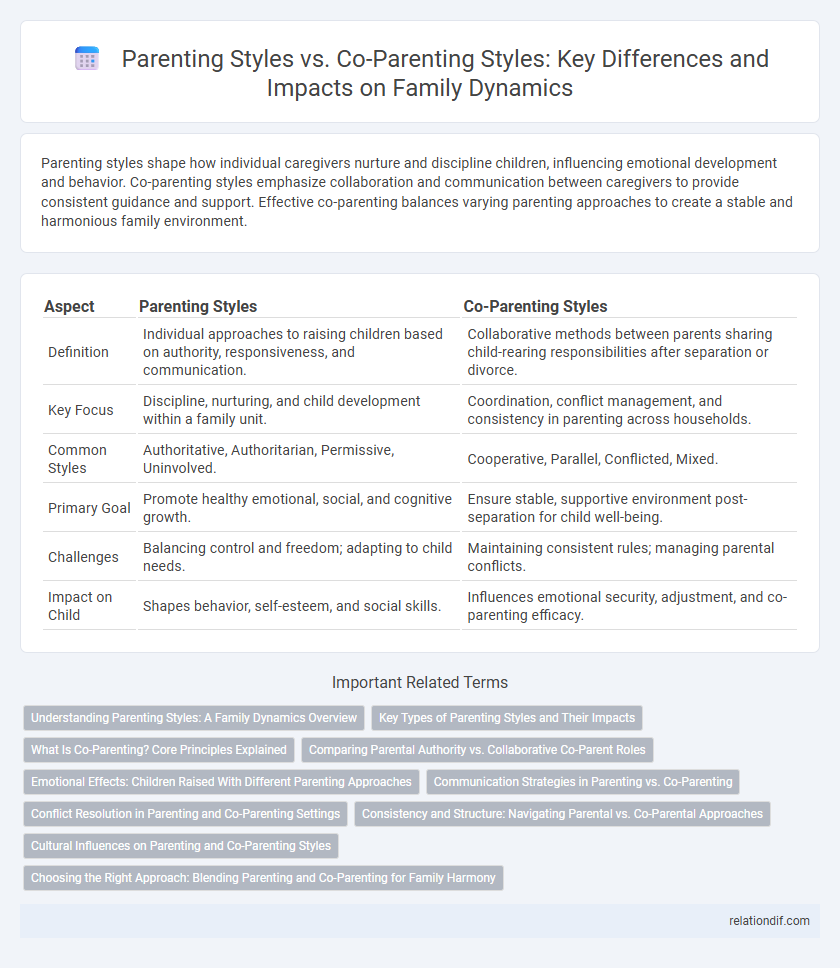Parenting styles shape how individual caregivers nurture and discipline children, influencing emotional development and behavior. Co-parenting styles emphasize collaboration and communication between caregivers to provide consistent guidance and support. Effective co-parenting balances varying parenting approaches to create a stable and harmonious family environment.
Table of Comparison
| Aspect | Parenting Styles | Co-Parenting Styles |
|---|---|---|
| Definition | Individual approaches to raising children based on authority, responsiveness, and communication. | Collaborative methods between parents sharing child-rearing responsibilities after separation or divorce. |
| Key Focus | Discipline, nurturing, and child development within a family unit. | Coordination, conflict management, and consistency in parenting across households. |
| Common Styles | Authoritative, Authoritarian, Permissive, Uninvolved. | Cooperative, Parallel, Conflicted, Mixed. |
| Primary Goal | Promote healthy emotional, social, and cognitive growth. | Ensure stable, supportive environment post-separation for child well-being. |
| Challenges | Balancing control and freedom; adapting to child needs. | Maintaining consistent rules; managing parental conflicts. |
| Impact on Child | Shapes behavior, self-esteem, and social skills. | Influences emotional security, adjustment, and co-parenting efficacy. |
Understanding Parenting Styles: A Family Dynamics Overview
Parenting styles encompass authoritative, authoritarian, permissive, and uninvolved approaches, each influencing children's development and family dynamics differently. Co-parenting styles involve how caregivers collaborate in raising children, affecting consistency and emotional support within the family unit. Understanding these styles clarifies the impact on child behavior, emotional health, and overall family harmony.
Key Types of Parenting Styles and Their Impacts
Authoritative, authoritarian, permissive, and uninvolved are the key parenting styles, each influencing child development differently; authoritative parenting promotes positive social skills and academic success, while authoritarian may lead to obedience but lower self-esteem. Co-parenting styles, including cooperative, parallel, and conflicted approaches, significantly affect a child's emotional security and adjustment, with cooperative co-parenting fostering stability and better behavioral outcomes. Understanding the impact of these styles helps parents create nurturing environments that support healthy psychological and social growth in children.
What Is Co-Parenting? Core Principles Explained
Co-parenting refers to a collaborative approach where two or more adults share responsibilities and decision-making in raising a child, often applied after separation or divorce. Core principles include open communication, mutual respect, consistency in rules and discipline, and prioritizing the child's well-being above personal conflicts. Effective co-parenting fosters a stable environment, reducing stress and promoting healthy emotional development for children.
Comparing Parental Authority vs. Collaborative Co-Parent Roles
Parental authority in traditional parenting styles emphasizes hierarchical decision-making where one parent typically holds more control over rules and discipline. Collaborative co-parenting styles prioritize shared decision-making, communication, and mutual respect between both parents to jointly support the child's development. Research shows that co-parenting models fostering cooperation improve child well-being by reducing conflicts and promoting consistency in parenting approaches.
Emotional Effects: Children Raised With Different Parenting Approaches
Parenting styles such as authoritative, authoritarian, permissive, and neglectful profoundly shape children's emotional development, influencing self-esteem, anxiety levels, and social competence. Co-parenting styles, characterized by cooperation, conflict, or disengagement between parents, further impact children's emotional security and behavioral outcomes. Research shows that positive co-parenting combined with authoritative parenting promotes resilience and emotional stability in children.
Communication Strategies in Parenting vs. Co-Parenting
Effective communication strategies in parenting emphasize consistent and clear messaging tailored to the child's developmental needs, fostering emotional security and behavioral guidance. In co-parenting, communication focuses on collaboration and conflict resolution between parents, ensuring unified approaches and minimizing mixed signals to the child. Both styles benefit from active listening, empathy, and regular updates to maintain harmony and support the child's well-being.
Conflict Resolution in Parenting and Co-Parenting Settings
Parenting styles such as authoritative, authoritarian, and permissive influence how conflicts within the family are managed, with authoritative parenting promoting open communication and balanced discipline for effective resolution. Co-parenting styles require coordinated conflict resolution strategies where both parents actively collaborate, emphasizing consistency and mutual respect to minimize disputes that affect the child's well-being. Effective conflict resolution in co-parenting settings hinges on clear communication, shared decision-making, and conflict management skills to foster a stable, supportive environment for children.
Consistency and Structure: Navigating Parental vs. Co-Parental Approaches
Parenting styles emphasize consistency and structure within a single caregiver's approach, often reflecting personal values and disciplinary methods. Co-parenting styles require synchronized strategies between two or more caregivers to maintain unified routines and expectations, reducing confusion for the child. Navigating these approaches demands clear communication and mutual commitment to stability, ensuring developmental support and emotional security.
Cultural Influences on Parenting and Co-Parenting Styles
Parenting and co-parenting styles are deeply shaped by cultural values, with collectivist societies often emphasizing cooperative, community-oriented approaches, while individualistic cultures prioritize autonomy and independence in child-rearing. In co-parenting, cultural norms influence communication patterns, decision-making processes, and the division of responsibilities between parents. These cultural influences impact children's social development and family dynamics, highlighting the need for culturally sensitive parenting strategies in diverse populations.
Choosing the Right Approach: Blending Parenting and Co-Parenting for Family Harmony
Selecting the ideal approach to family dynamics involves blending authoritative parenting styles with cooperative co-parenting strategies, fostering mutual respect and consistent discipline. Effective co-parenting emphasizes communication, shared responsibilities, and conflict resolution, creating stability for children and reducing stress among caregivers. Integrating these methods enhances emotional well-being, promotes healthy child development, and supports long-term family harmony.
Parenting styles vs Co-parenting styles Infographic

 relationdif.com
relationdif.com